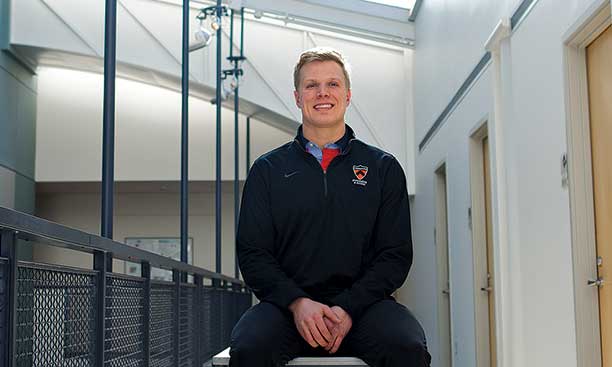Start-Up Students
Entrepreneurs Zietz ’22, Marquardt ’21 draw inspiration from athletics
Problems create opportunities. That’s the thinking that launched Rachel Zietz ’22 and Matthew Marquardt ’21 toward entrepreneurial pursuits.
Zietz, the founder and CEO of Gladiator Lacrosse, first got the idea for her company in the seventh grade. An avid lacrosse player from Boca Raton, Fla., Zietz was practicing one afternoon and ripped a hole in the rebounder net she was using. Instead of purchasing another one, she figured out a way to create a more durable version.
“That was my a-ha moment,” Zietz said.
She realized that selling her product was a real possibility after teammates in middle and high school confirmed they had experienced the same problem. After a year-long program at a Florida Young Entrepreneurs Academy, which teaches middle- and high-schoolers skills to be entrepreneurs, Zietz won funding through a pitch competition and launched her business.
Zietz has learned to navigate the demands of her coursework, sport, and business — scheduling company calls between classes, for example.
It took another year to create the product with a manufacturer, produce a website, and put processes in place for efficient ordering and shipping. Zietz also did a lot of work on the ground, setting up booths at lacrosse tournaments, scheduling after-school sales calls, and managing the warehouse supply.
Marquardt had a similar experience. As a high school senior, he qualified for the U.S. Olympic Swimming Trials in the 200-meter backstroke event in 2016. For the event, swimmers can use an assisting wedge placed on the wall in the water to prevent their feet from slipping at the start of the race. Marquardt needed one for practice and balked at its high price (about $700).
Marquardt and his brother found the specifications and made their own, using a 3D printer Marquardt received for Christmas. Once news got around, friends, coaches, and others in his swimming circles encouraged Marquardt to put his product, BackFin, on the market.
It took months — at that point he was in his first year at Princeton — but working with University athletics staff, Marquardt obtained the NCAA waiver needed to sell his product.
Once he got the OK, BackFin became a family operation. Marquardt purchased two additional printers so products could be created in the basement of his family’s Ohio home. His parents would ship the parts to Princeton; he’d assemble the wedge in his room and ship it to the customer.
Though he made a small profit, “our goal was not necessarily to make money off of it — it was to enable accessibility of this extremely expensive swimming [equipment] to people that couldn’t necessarily afford it,” Marquardt said.
As Princeton students, Zietz and Marquardt have continued to make entrepreneurship a major part of their stories.
Now in its seventh year of business, Zietz’s company has hit many milestones: She appeared on an episode of Shark Tank; the products are sold in Dick’s Sporting Goods; she’s hired eight full-time staff members; and she was recently recognized as one of Forbes magazine’s “30 Under 30” entrepreneurs in retail. This year Gladiator Lacrosse expects to make $7 million in revenue and recently acquired the company All Ball Pro.
Marquardt, meanwhile, largely shifted his focus from his business to academic and longer-term career interests, though he’s still fulfilling occasional orders. After pursuing interests in sustainability and medicine during his first two years at Princeton, Marquardt took a leave of absence to figure things out. He remained in Princeton to work for Andluca Technologies, a startup headed by engineering professor Yueh-Lin (Lynn) Loo *01 that designs solar technology for “smart” windows. Marquardt is back at Princeton as a junior majoring in chemistry and working at Andluca.
“I do not deem it a success, but I also don’t deem it a failure,” he said of his own company. “Just because you didn’t make a billion-dollar company does not mean that you didn’t learn something. My brother and I, we learned a ton from that, and I would say that was really kind of the springboard into the other things that I had done since.”
Both student entrepreneurs continue to be athletes. Marquardt is a member of Princeton’s swimming and diving team, practicing an average of 20 hours per week. Zietz is the co-captain of the women’s club lacrosse team. Time management is key.
“There are definitely days that run smoother than others,” said Zietz, who has learned to navigate the demands of her coursework, sport, and business — scheduling company calls between classes, for example. She spends between 10 and 20 hours per week managing her business.
Marquardt added that it is equally important to periodically take a step back and reflect. “Most Princeton students have the mentality of just go, go, go — this is the path I’m on,” he said. When he took time to pause, he found moments when he could ask himself: What do I want?
“That was not comfortable,” he said, “but it was necessary in order to grow.”













No responses yet